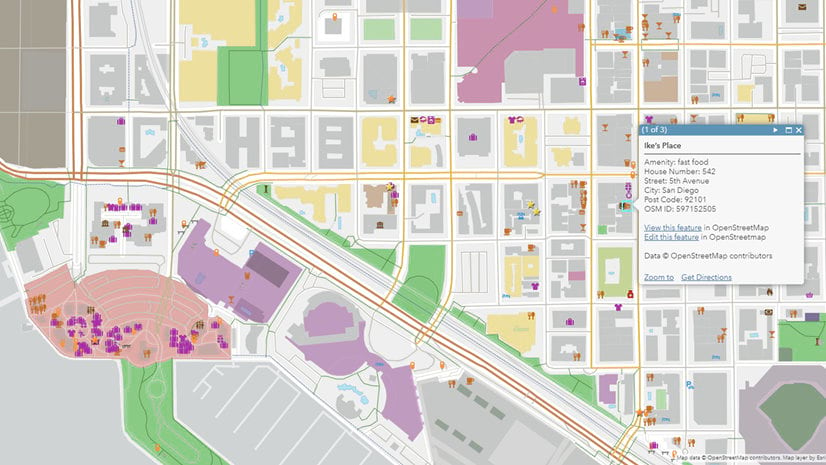This article provides a technical overview for European organisations of how ArcGIS supports the EU Open Data Directive requirements and practical resources to get started today.
ArcGIS helps you meet your open data objectives and unlock its full potential by streamlining the process of publishing data for download and dynamic data access with APIs, discoverability, and the friendly reuse of data.
The value of open data
From climate adaptation to food security, mobility, and more, today’s complex challenges require a geographical approach enabled by FAIR[1] and open data.
Data produced by the public sector is particularly interesting for reuse in value-added services and applications that address contemporary challenges. For example, cities like Prague in the Czech Republic fight climate change[2] by combining local and other open data, such as Copernicus’s Earth observation data, to better understand the relationship between human health, urban heat islands, green zones, and built-up areas.
Putting open data into the hands of leaders, decision-makers, knowledge workers, students, researchers, innovators, and the public means more of Europe’s brightest minds can apply a geographical approach to problem-solving. As we confront the greatest issues of our time, location data can help reveal patterns and trends, model scenarios and solutions, and, ultimately, help people make sound, strategic decisions.
EU Open Data Directive
The pioneering EU Open Data Directive[3] aims to make open data broadly available to address European priorities. The Directive explicitly recognises the socioeconomic benefits of the friendly reuse of geospatial, Earth observation, and environment, meteorological, statistics, business, and mobility datasets.
The Directive is based on the general principle that public and publicly funded data should be reusable for commercial or non-commercial purposes. In addition, the Commission Implementing Regulation (EU) 2023/138 of 21 December 2022[4] lists specific high-value datasets (HVDs) and the arrangements for their publication and re-use, including datasets within the scope of the INSPIRE data themes.
Public authorities must ensure that all the datasets from the list of high-value datasets (HVD)[5] are available from 9 June 2024 under reuse-friendly conditions: free of charge, in machine-readable format that is accessible, findable, and reusable, complete with their metadata, via Application Programming Interfaces (APIs) and, where relevant, as a bulk download.
ArcGIS open data capabilities
Esri commends the Open Data Directive[6] and is committed to supporting open data objectives and requirements, including open formats, reuse through electronic means, online search and discovery, dynamic data available via an application programming interface (API), and, where relevant, as a bulk download. ArcGIS supports the EU Open Data Directive requirements in several ways:
Table: ArcGIS makes meeting or exceeding all EU Open Data requirements easy.
| Open Data requirement | Meets or exceeds | ArcGIS support |
|---|---|---|
| Share open data in any pre-existing format | ✓ | Share wide variety of open geospatial data in pre-existing formats including GeoJSON, GML, KML, and GeoPackage, as well as maps, apps, and non-spatial data like documents, spreadsheets, tables, PDFs, and more (see the complete list). |
| Share open data in any pre-existing language | ✓ | ArcGIS supports the languages of the European Union; ArcGIS Hub includes on-the-fly site translation for your site, catalogue, down to the data layer field attribute level. |
| Share open data where appropriate, by electronic means in formats that are open, machine-readable, accessible, findable, and reusable | ✓ | Publish a variety of dynamic data layers using the GeoServices REST open specification, plus OGC Web Map Tile Service (WMTS), OGC API Features, and more (see the complete list). Learn more about how ArcGIS supports FAIR data principles. |
| Share as dynamic data available via an application programming interface (API) | ✓ | By default, ArcGIS uses the GeoServices REST open specification with ArcGIS REST APIs supported by clear documentation that enable easy reuse in maps, apps, and analyses; as well as the emerging OGC API family of standards. |
| Share open data where relevant, as a bulk download | ✓ | Various file formats are available depending on the type of item, including CSV, XLSX, KML, Shapefile, file geodatabase, GeoJSON, and GeoPackage (with hosted downloads); downloads in local projections is supported. |
| Share open data complete with their metadata | ✓ | ArcGIS provides metadata (human-readable HTML and machine-readable XML) tightly coupled with your content, supporting a variety of international open standards including ISO Metadata and INSPIRE Metadata. |
| Online search and discovery | ✓ | Every Hub site comes with human- and machine-readable catalogue for sharing open data; view item details, read the full metadata, and explore or filter the content dynamically before downloading or using data directly via web data layer or web service APIs. |
| Federate with open data registries | ✓ | Federate catalogue content with other EU open data portals using the automatically generated European data catalogue vocabulary DCAT-AP, GeoRSS, and OGC API Records. |
| High-value datasets (HVD) | ✓ | HVD are supported through ArcGIS INSPIRE Open Data and ArcGIS for INSPIRE Classic, including both the default INSPIRE-specific data models and formats and a selection of streamlined INSPIRE fGDB templates following INSPIRE good practices. |
| Reporting | ✓ | A downloadable list of datasets and online reference to metadata is available from the ArcGIS Hub catalogue to support Article 5 Reporting requirements. |
Open formats for friendly reuse
Provide open geospatial data, maps, apps, and non-spatial data like documents, images, spreadsheets, tables, PDFs, and more to your community’s residents, students, journalists, business innovators, and civic developers.
ArcGIS supports the EU Open Data Directive with multiple open formats for reuse through electronic means, including modern web services via APIs and bulk downloads in human- and machine-readable formats.
Highly performant, scalable web services in ArcGIS Online ensure that your open data can meet demand when shared with your community or the world. Therefore, end-users can quickly put data layers to use in decision-ready information products or use easy-to-build no-code and low-code application builders.
Metadata is according to international standards, including ISO and INSPIRE metadata formats. ArcGIS helps ensure your spatial datasets are available according to Findable, Accessible, Interoperable, and Reusable (FAIR) data principles. Additionally, ArcGIS supports simplified and modern delivery of High-Value Datasets (HVD) within the scope of the INSPIRE data themes.
Online search and discovery
ArcGIS Hub supports online search and discovery via an open data catalogue. Dynamic data are available via an application programming interface (API) and, where relevant, bulk download.
Hub’s open data catalogue improves discoverability. Hub automates search engine optimisation (SEO) techniques following WCAG accessibility guidelines. It provides a human and machine-readable data catalogue of web services with API access.
The automated catalogue feeds use international open standards, including GeoRSS, OGC API Records, and the European data catalogue vocabulary, DCAT-AP, to help you federate your open data to open data portals like data.europa.eu. Hub also supports multi-lingual capabilities with automatic translations and licence generation for Creative Commons Public Domain Dedication (CC0) or, alternatively, other less restrictive standard public licences.
Share open data
Worldwide, local, national, and pan-European communities use ArcGIS to engage with stakeholders and deliver open data. Here are just a few examples:
- In the Czech Republic, the City of Brno[7] breaks down siloes by sharing standards-based open data.
- In the Netherlands, the Assen GeoHub[8] supports the municipality’s vision of a transparent, reliable, and easily auditable government.
- In Ireland, the national geospatial open data hub GeoHive[9] provides no-cost, web-based access to authoritative Irish spatial data from multiple providers, including Tailte Éireann, to meet the needs of citizens, businesses, and government.
By supporting the Open Data Directive, ArcGIS helps organisations ensure the friendly reuse of open data, applying a geographic approach for insights for decision-making.
Get started today
Build on what you already have. ArcGIS Online includes ArcGIS Hub open data capabilities as a free extension, so organisations with a subscription already have access and can get started immediately.
Leverage the following resources to get started today, or contact your local Esri distributor for assistance:
- How to create a simple Open Data site – Get familiar with these simple steps to build a performant Open Data site and curate data that is easy to reuse.
- Esri Academy Web Course: Sharing Open Data Using ArcGIS Hub (Basic) – In this course, students will learn how to configure a site and share approved open data with the public.
- Create INSPIRE Metadata using ArcGIS’s New Metadata Editor – This tutorial provides step-by-step guidance to create INSPIRE Metadata using the new ArcGIS metadata Editor.
- ArcGIS INSPIRE Open Data – ArcGIS supports the simplification and modernisation of INSPIRE as it evolves to support data-driven decision-making and innovation and contribute to the Green Deal Data Space.[10]
- Contact your local European-owned software company – Esri has been in Europe for more than 40 years. European-owned software companies in almost every country have decades of local experience.
References
[1] Saligoe-Simmel, J., M. Gould, and S. Sankaran, 2022. Help to make your data FAIR. ArcGIS Blog. https://www.esri.com/arcgis-blog/products/arcgis/sharing-collaboration/help-to-make-your-data-fair-part-1/
[2] Esri Case Study. Czech Republic: Fighting Climate Change – A New Challenge in Europe https://www.esri.com/en-us/about/about-esri/europe/case-studies/czech-republic-case-study
[3] EU Publications Office, 2023. Open data and the reuse of public-sector information, web resource href=”https://eur-lex.europa.eu/EN/legal-content/summary/open-data-and-the-reuse-of-public-sector-information.html
[4] Commission Implementing Regulation (EU) 2023/138 of 21 December 2022 laying down a list of specific high-value datasets and the arrangements for their publication and re-use https://eur-lex.europa.eu/legal-content/EN/TXT/?uri=celex%3A32023R0138
[5] European Commission. High-value datasets: Questions and Answers. https://digital-strategy.ec.europa.eu/en/faqs/high-value-datasets-questions-and-answers accessed 6-Mar 2024.
[6] Esri Announcements, 2021. Esri Commends European Union’s Open Data Directive https://www.esri.com/about/newsroom/announcements/esri-commends-european-unions-open-data-directive/
[8] https://opendata-assen.hub.arcgis.com/ and Esri Nederland, Dec 2019. Het innovatieve open data portaal van Assen (The innovative open data portal from Assen (Google translate)) https://www.esri.nl/nl-nl/nieuws/archief/nieuwsoverzicht-2019/het-innovatieve-open-data-portaal-van-assen
[9] https://www.geohive.ie and https://www.esri.com/content/dam/esrisites/en-us/media/fliers/gis-census-cs-ireland-flier-web.pdf
[10] INSPIRE Knowledge Base: Evolution. https://knowledge-base.inspire.ec.europa.eu/evolution_en accessed 12-March 2024




Commenting is not enabled for this article.